By any other name: Raleigh's DEI coverup exposed
With a covert rebrand, webpage removals, and censored language, Raleigh's budget contains funding for both its Department of Equity and Inclusion (with DEI staff) and the Triangle DEI Alliance
“A rose by any other name would smell as sweet,” wrote the famed English playwright; and by the same logic, Raleigh’s Department of Equity and Inclusion may be just as in violation of President Trump’s anti-DEI executive orders even with a fresh name and the scrubbing of many references to “diversity,” “equity,” and “inclusion” from city publications.
The City of Raleigh’s commitment to DEI despite the federal (and state) efforts to crack down on the discriminatory practices was highlighted in a recently published undercover video published by Accuracy in Media titled “Raleigh Government Official Caught Hiding DEI Efforts Amid Federal Crackdown.”
In the video, then-Assistant Director of Equity and Inclusion Briana Scurry is secretly recorded describing to the AIM journalist how they are “being strategic” in not “drawing attention to [themselves]” in order to “make sure that this work is protected as possible.” In another clip, Scurry refers to the city’s Department of Community Engagement as a “champion of DEI” which frequently “partners” with her own department.
In response to the video, the city’s public information officer Julia Milstead told the News & Observer that the video “misrepresents the context,” and that those remarks were filmed in February shortly after Trump’s anti-DEI executive orders were signed making it a “period of uncertainty” when the “city was taking a step back to evaluate the department’s services.”
Milstead also claimed that the Department of Economic and Social Advancement, of which Scurry is now the Assistant Director, was launched “as of the new fiscal year” with “its work support[ing] a range of small business and community activities, including connecting businesses with resources,” and that Scurry’s statements “do[] not represent the current work of this department.”
However, budget documents, personnel continuity, and the city’s own web pages indicate that the “Department of Economic and Social Advancement” is not, in fact, a new department, but rather a direct rebranding of the “Department of Equity and Inclusion.”
2026 budget: DEI vs DESA
The DESA’s first appearance in the city’s budgets is indeed for the 2026 fiscal year, with a budget of $2,613,685 and 19 full time positions (page 156), with a budget detail listing of the amount allocated for DESA in the past three budgets, figures which exactly match the allocation of $2,392,131 for the DEI in the FY 2025 budget1.
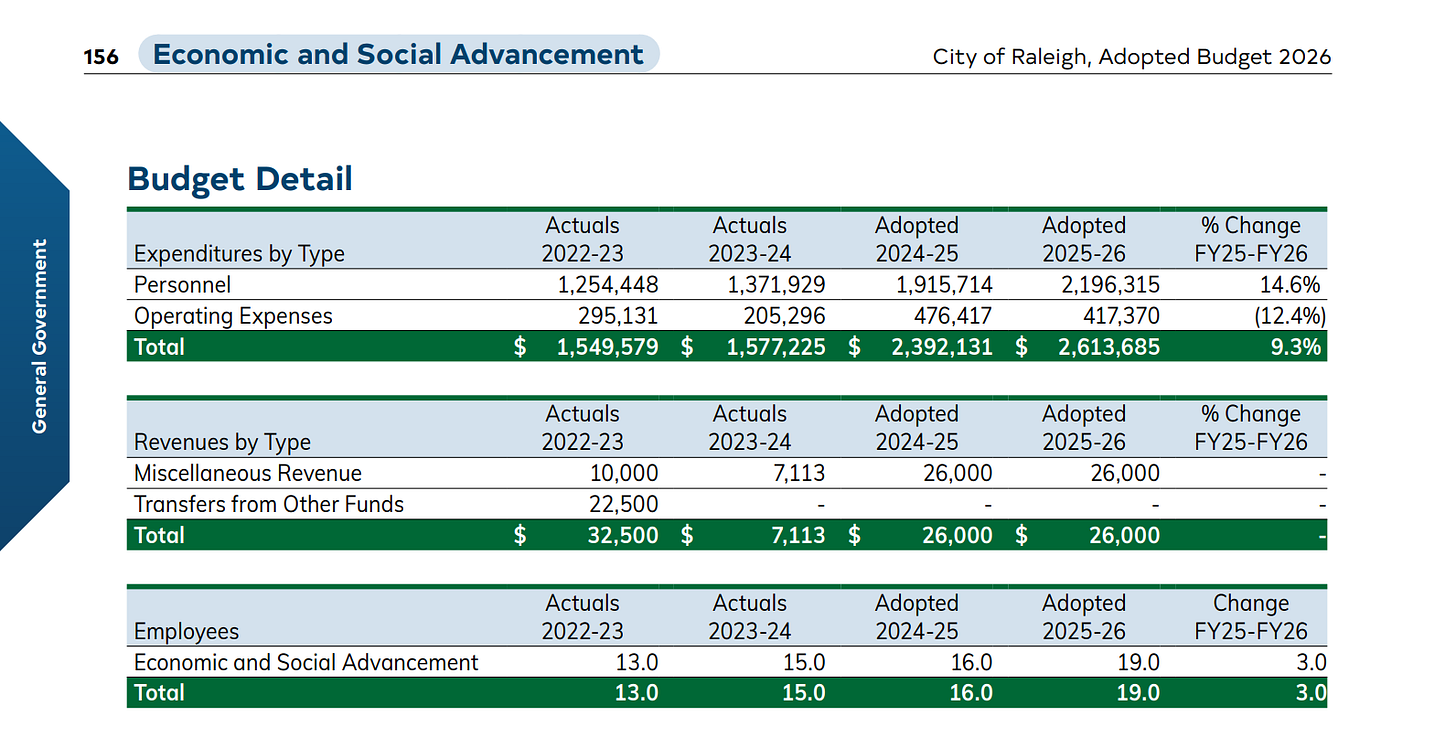
Although the FY 2026 budget seems to have no mention of the how the DESA seemingly appeared out of thin air, the “Key Initiatives” listed for the DESA exactly parallel those of the DEI in the FY 2025 budget, but with specific references to “equity” replaced with generic terms, such as “meaningful organizational trainings” substituted for “equity trainings” and “initiatives that address specific departmental needs or gap areas” substituted for “initiatives outlined in the Racial Equity Action Plan.”
In contrast of the opaque “launch” of the DESA in the FY 2026 budget, the FY 2021 budget explicitly referenced the creation of the DEI (then referred to as the Office of Equity and Inclusion) with an initial budget of $963,732 and nine staff members transferred from the Housing & Neighborhoods Department. As expected for a newly created department, the budget did not list any funding for the DEI in previous budgets:
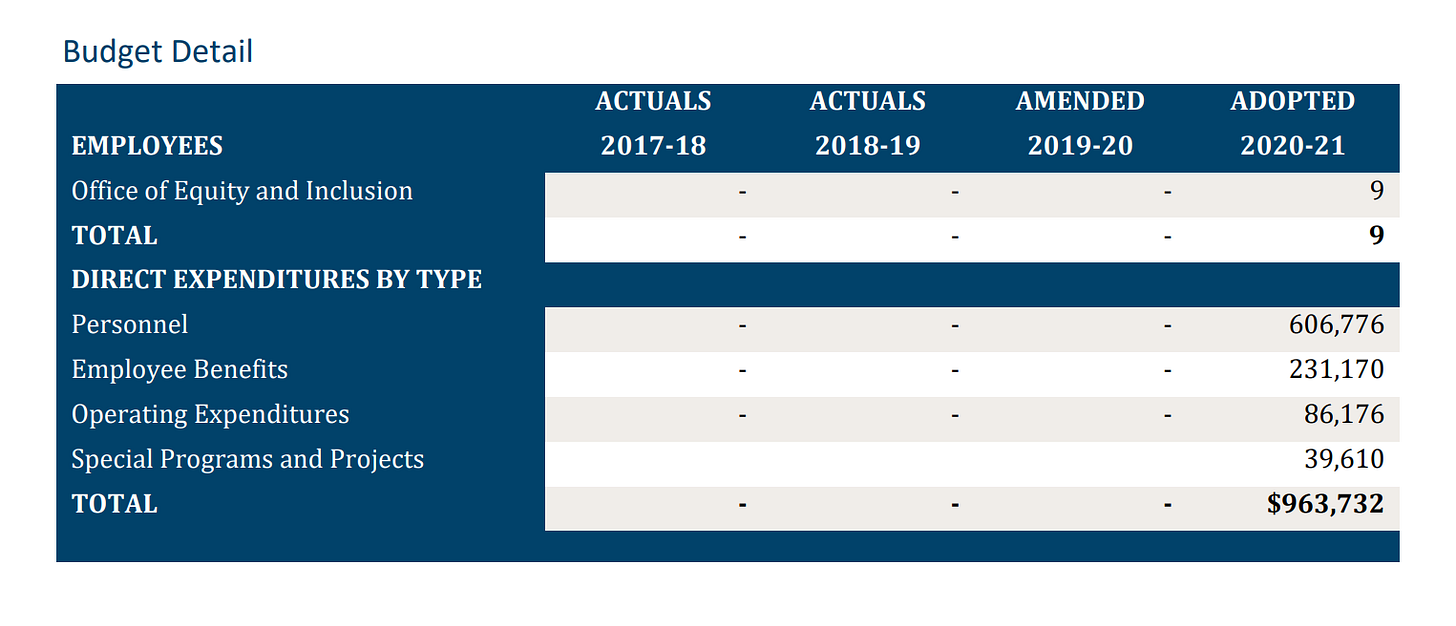
DEI staff: implementing Raleigh’s “commitment to the principles of diversity, equity and inclusion”
The continuity between the DESA and the DEI is also highlighted in the continuity of the staff, like Scurry, who was Assistant Director of the DEI at the time her comments were recorded, but is now listed under DESA on the city’s staff directory.
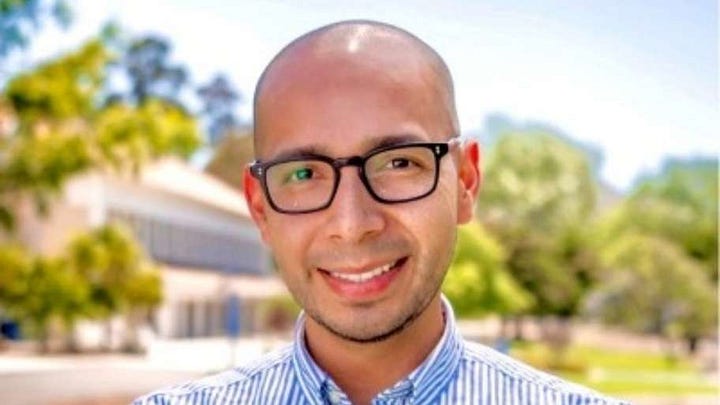
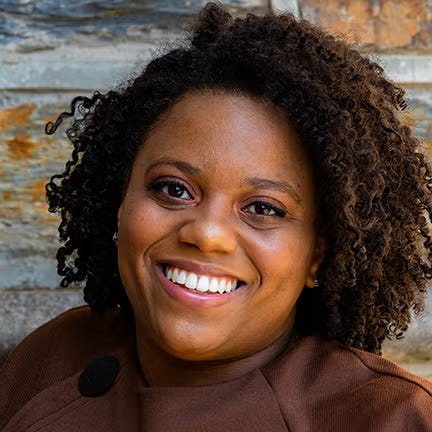
Prior to joining Raleigh’s Department of Equity and Inclusion, Scurry “demonstrated her commitment to DEI” as a Residence Coordinator at Duke University by “integrating anti-racism, bias, and dialogue facilitation training into her work as a pillar of student development,” as described in a news release on her joining UNC-Chapel Hill’s computer science department as a Diversity, Equity & Inclusion Coordinator in 2021.
In the article, Scurry described her DEI work as follows: “DEI work is an acknowledgement that there are groups who simply have not been given opportunities, and thus there should be a concerted and consistent effort to address the systemic issues that are put in front of these groups on a daily basis.”
Although DEI is sometimes couched in terms of fairness and equal opportunities, data from Students for Fair Admissions v. University of North Carolina lawsuit (which in the overturning of affirmative action by the Supreme Court) revealed that the university’s DEI goals were implemented through racial preference in admissions, with black applicants being up to 33 times more likely to be admitted than their Asian American counterparts with comparable academic performance.
The recruitment flyer for a new DEI Director hired in December 2024 expressed the same commitment to “equality of outcomes” which provides the justification for such blatant racial discrimination, with the following quote from the city’s “Statement on Equity from 2022 Equity Action Plan:”
The City of Raleigh is committed to establishing and advancing an equitable community for all. Because we know that race is the primary predictor of a person’s outcomes across all social indicators and societal systems, the City of Raleigh will prioritize racial equity to dismantle the policies and systems that have created and sustained these inequities.
Inequities in our systems and policies are costly and limit positive outcomes and quality of life for all of us. When we achieve racial equity, all people in Raleigh will benefit from a more just, equitable system. Raleigh aspires to be a model for equity in local government.
The city ultimately chose Nestor Veloz-Passalacqua to fill this position, a candidate whose DEI experience included leading the Office of Diversity, Equity, and Inclusion as the DEI Manager in the City of San Luis Obispo, California and working as DEI Program Manager for the County of San Luis Obispo Behavioral Health Department.
In the since-deleted announcement of Veloz-Passalacqua’s selection, his role was described as to “provide vision and strategic direction to guide City Council goals and policies and embed equity and inclusion throughout the organization” and to “develop internal partnerships to strengthen organizational culture and elevate the City’s commitment to the principles of diversity, equity and inclusion.”
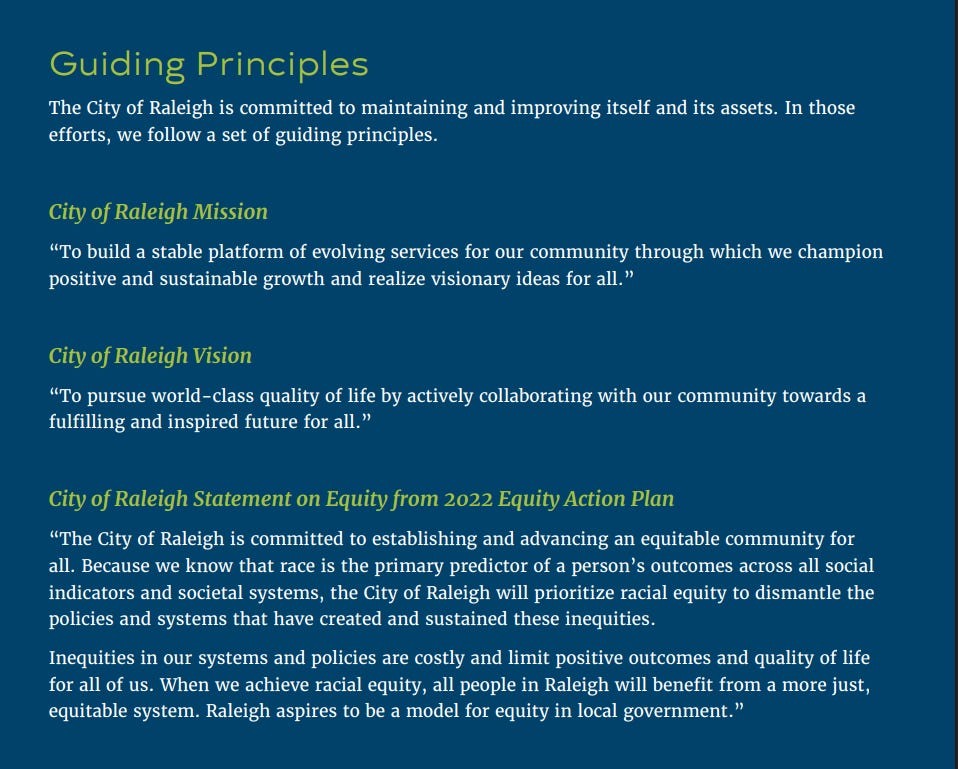
Missing webpages and compliant rewording
The news release welcoming Veloz-Passalacqua as DEI Director is not the only page on the city’s website to be taken down or reworded to remove references to diversity, equity, or inclusion.
The page for the DEI, which previously described the department’s focus as “embedding equity within our organization and the communities we serve” with oversight of issues related to “persons with disabilities, gender identity, sexual orientation, race, ethnicity, community health, and social justice” now redirects to the DESA page, which replaces the politically charged language with references to “community for all” and “fairness and opportunity for all.”
Other pages, like the Key Areas of Equity and Inclusion, appear to have been deleted entirely, including its subpages on Affordable Housing, Zoning Reform, Transportation, Criminal Justice Reforms, Mental Health, and Education and Workforce Development.
One may surmise that the diversity, equity, and inclusion initiatives are pursuing the same values and agenda under the hood, but it is most obviously the case with the Minority and Women-Owned Business Enterprise (MWBE), which has been renamed to Business Engagement and Opportunities Program (BEOP) with the removal of language describing how the program “promotes diversity and inclusion in City of Raleigh contracting.”
Despite the name change, the MWBE program still operates along the same parameters, as the preference for businesses not owned by white males is in fact enshrined in state law, which sets a “verifiable ten percent (10%) goal for participation by minority businesses” for building projects by local government units which exceed $100,000 in cost and establishes an Office for Historically Underutilized Businesses for certifying qualifying MWBE contractors. (Raleigh does go above the state requirements, setting its MWBE participation goal at 15%.)
Although it has yet to pass, the current budget proposal for 2025-2026 by Republican legislators would eliminate this state office and strike the accompanying language from a number of statutes, as well as repealing such measures including Minority business participation goals (§ 143‑128.2), Minority business participation administration (§ 143‑128.3), and “Historically underutilized business defined; statewide uniform certification” (§ 143‑128.4).
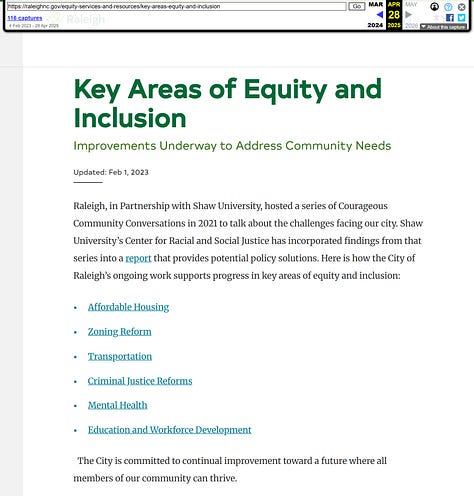
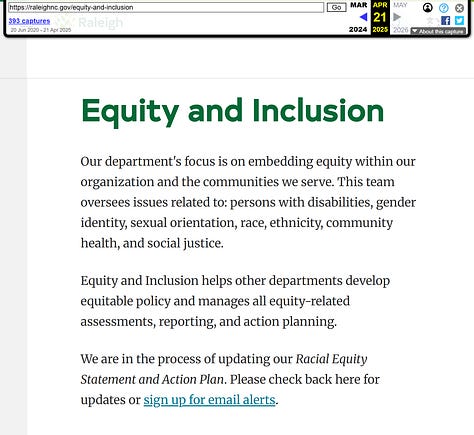
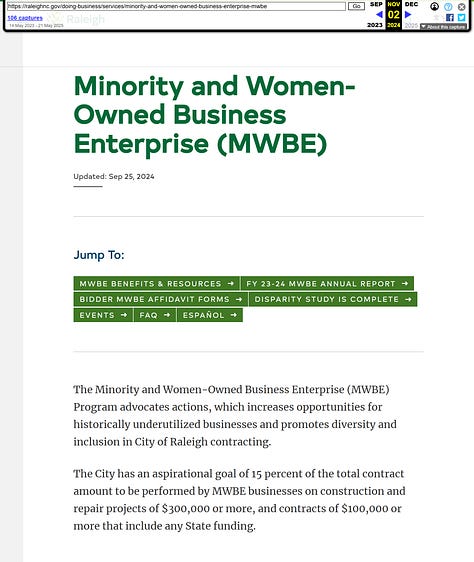
Triangle DEI Alliance
Raleigh’s FY 2026 budget no longer contains mention of Department of Equity and Inclusion, but it does allocate $30,000 for the Triangle Diversity Equity and Inclusion Alliance from the city’s Economic Development Fund, as well as $506,750 for the Triangle DEI Alliance’s parent organization, the Raleigh Chamber of Commerce.
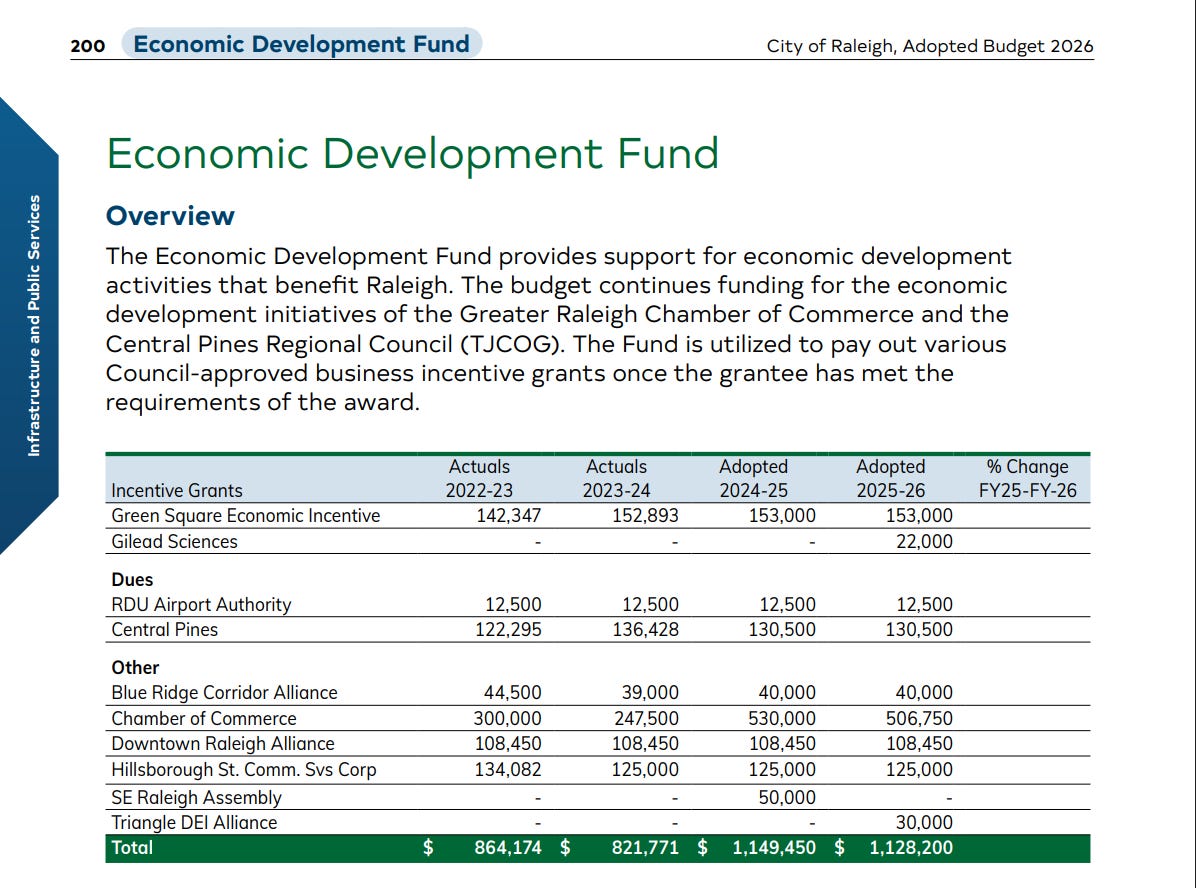
Although the FY 2026 budget appears to be the first to list the Triangle DEI Alliance as a separate line item from the chamber, the City of Raleigh as well as Wake County were described as providing “support” for the 2019 launch of the Triangle DEI Alliance in an article by the News & Observer.
In addition, both the city and the county were listed alone as the highest tier of “investors” on the Triangle DEI Alliance’s website, which has also been taken down this year, along with its social media presence.
Among other initiatives, the Triangle DEI Alliance has been behind an annual Diversity, Equity and Inclusivity Conference, which attracted over a thousand attendees in 2024.
The Economic Development Fund also includes $108,450 for the Downtown Raleigh Alliance, the administrator of the Downtown Raleigh Municipal Services District, which has previously touted its “commitment to Diversity, Equity, and Inclusion” as well as being a “proud member of the Triangle DEI Alliance” on another webpage which has since been removed.
One way the DRA has pursued the diversity, equity, and inclusion agenda is by offering a “diverse business funding booster” as part of its Storefront Upfit Grant, in which businesses with majority ownership by minorities, women, LGBTQ, veterans, or the disabled can qualify for more funding than those local businesses not owned by these preferred categories.
The grant program is still on the DRA website, though it is now listed as being offered by a nonprofit, Raleigh Civic Ventures, with funding by the Duke Energy Foundation.
Although the FY 2025 and FY 2023 figures in the FY 2026 budget for DESA match the FY 2025 and FY 2023 figures in the FY 2025 budget for the DEI, the $1,577,225 listed in FY 2026 as the DESA budget for FY 2024 does not match the DEI budget for FY 2024, which is listed as $2,038,814 in both the FY 2024 and FY 2025 budgets

Great reporting..going where others fear to tread.